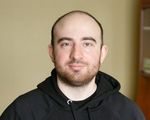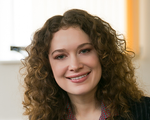About Success Builder
How do you find your place in life? How do you find something to do that both comes naturally to you and makes you happy? The answer is that you have to apply the knowledge you’ve gained from university and from life itself correctly. The Success Builder Project features HSE University graduates who have discovered themselves through an interesting business or an unexpected profession. The protagonists share their experiences and lessons learnt and talk about how they’ve made the most of the opportunities they were given.
In June 2014, a law was passed that requires participants of the housing and utilities market, including management companies and homeowner associations, to move all of their data to the Government Services Portal (www.gosuslugi.ru). Virtually overnight, this created an enormous market for IT companies capable of helping resolve issues associated with automating the transfer. The company Telecom-Project, which was founded by HSE graduate Evgeny Tsaplin, is currently a leader in this market.
In the latest edition of Success Builder, Tsaplin talks about why he never worked as a contractor and how he found where the money was in this new market. He also shares how he utilized the concepts from his lectures in his own business and dealt with the complicated psychology of the house manager.
25 783
management companies, 29,523 homeowners associations, and 6,007 building cooperatives currently operate in Russia
Why did you decide to continue your education even though you already had a working business project underway at the time? And why HSE?
I came to HSE at a very conscious age, so to speak – I was almost 28 and I came for a theoretical foundation. My business practices, and my mind, needed a revolution. I founded my current company Telecom-Project in 2007 before I started my master’s at HSE, and I was severely lacking knowledge of contemporary marketing theory. This is why I chose HSE’s Marketing Communications and Advertising in Contemporary Business master’s programme. It’s the master’s concentration closest to business that teaches you the right way to contact consumers, and this is the forefront of entrepreneurship. There’s no point in learning how to produce something if you don’t know how to sell it. I had already been acquainted with Nikolay Filinov from the open house, and I knew about the works of Mikhail Nazarov, who is the head of the programme. So in the end, I knew I had made the right decision in selecting this programme.
Why did you decide to go into business, and what is necessary to do so?
I had never worked as a contractor, not counting teaching at HSE, but it’s really a passion, not a job, and it’s really satisfying to be able to do what you love. At the start of my career in 2002 I sold mobile phones and telecommunications equipment with a company called Inoline at the time. Then a transformation began, and the business moved into software development. The peak of the transformation came during my studies at HSE, where I had a system worked out: I’d learn the material from class and then apply it to the business. I was particularly successful at putting my new knowledge of advertising and consumer interaction into practice.
You’re now the successful owner of the company Telecom-Project. Did you ever try doing something else when the business didn’t seem to be going smoothly?
The company is constantly evolving and changing its business strategy based on market demands. As concerns some of our most recent changes, we brought an array of different services to market. Aside from the current headliner, which focuses on housing and utility integration, there’s also an entire system for automated quality control that is now being used at different construction companies and universities. For universities, we also have various developments in the field of educational process management and LMS. Of course, you can’t always avoid failure though. An example: a website for finding remote employees, rabotas.com, was unable to start posting returns, so we froze the project. There were also mishaps with different successful projects as well; for example, when we changed the main programming language from ASP.NET to PHP/MySQL, several segments of code had to be rewritten, and huge losses were written off all because the incorrect language had initially been chosen.
We assessed the projects currently operating on the market and concluded that we can surpass them by successfully updating our business model. It doesn’t take a psychic, just simple logic and research experience, which is what you get in the HSE master’s programme
Can you tell us about your most successful product, GKH Integration?
A few years ago, our marketing department started researching prospective business areas. The department conducts in-depth competitive analysis and is constantly searching for new business ideas that have already proven themselves on the market. This is an ongoing process. Several times a month, I get analytical research on new startups, products, and services. The point of the research is to answer the question, ‘what will happen if we make the same product, only better, and bring it to market?’
GKH Integration was actually a result of this kind of research. After Federal Law No. 209 was passed, all management companies were required to meet a new set of requirements, including those that cover software and reporting. We assessed the projects currently operating on the market and have concluded that we can surpass them by successfully updating our business model. It doesn’t take a psychic, just simple logic and research experience, which is what you get in the HSE master’s programme. This is why I consider my alma mater to be an integral part of my success.
Our company organises around 10 business experiments a year, and in each one we bring a brand new prototype to market and test it. As a general rule, nine out of 10 projects end up failing. This is normal, and we have a budget of roughly 500,000 rubles a year for these experiments. We are chronic startup fanatics who are constantly bringing new products to market.
This is real experimentation. And what does your company do with that one special project that succeeds?
After a member of our marketing department has identified a prospective market, one such as municipal engineering, we create a website and a prototype for the product. A member of the sales team then starts calling around and we begin advertising. This is all meant to be a way of checking if the client is ready to pay; that is, the point of the experiment is to see whether a demand exists or not. We then launch the successful projects. The GKH Integration project is our ‘headliner’ right now, but the cycle ends in two or three years, and we are already working on new projects in the background.
What competencies does a marketing specialist have today?
Competitive analysis, an understanding of the consumer’s needs, and the ability to sell products and services to the consumer. Marketing is also really useful when selecting business strategies, especially when you’re bringing a new product to market. All entrepreneurs are above all marketers, but in a certain sense they are psychologists as well since they have to understand the subtle and vulnerable soul of the consumer. Creating a new product and bringing it to market are what particularly inspire me in the profession.
>600
management companies and HOAs from all over Russia are clients of Telecom-Project
I don’t think you are alone on the new market. What helped you surpass your competitors?
The market is still taking shape, so competition is chaotic. There are very few on the market who actually understand what’s happening. When a fast-moving trend arises, clients don’t know what they want, and the entrepreneur doesn’t know what to offer them. This is when you have to be first, but you also need to be confident. The Telecom-Project is dominating the market thanks to experience and well thought out scenarios.
Housing and utility workers are rather unusual clients. How did you study them – focus groups, observation, surveys on residents?
The clientele is definitely unique, and they require additional attention and assistance. We are already experimenting to build a psychological portrait of the consumer, and we’re updating this so-called portrait after our initial call cycle. Who works in the housing and utilities sector? People 55 and older who write everything down in a notebook and act like housing managers. We tried to create some of the most effective methods of conviction when calling them because today’s salespeople aren’t necessarily trying to impose something on you; they are acting as your personal psychologist. After the business experiment, the calls and requests started pouring in.
How did you find the right name for the product you developed for housing managers?
We have stopped using the term ‘software’ even though we’re an IT company. We sell a service that is based on our software, and it’s called Solution as a Service (SaaS). If we simply install our software on a housing manager’s computer, right next to 1C, GIS ZKH, and Reforma GKH, then this will just be an added headache for them. In order to avoid driving them crazy, we sell a turnkey solution. It’s often the case that our client doesn’t know how to use Excel, which is why the management company sends us initial data in whatever format they have it in, and they then work with a special support department to make this data digital. This is what makes the project unique – we are not selling a product, but a solution based on a product.
Will automation increase unemployment among housing and utility workers?
The fewer workers a company has, the higher profitability is. Saving on expenses during a crisis is rule number 1, and if there are still ineffective workers in the housing and utility sphere, occupants will end up paying more for housing. The market was not created by Federal Law 209; it was ignited by it. Before that, the market didn’t even hint at changing, though 10 years ago most administrative tasks could have been digitized. Along with this law came new requirements for company managers who had been in the business for decades and, for example, manually kept a log of leaks in a building. It’s hard for these types of people to change, but they either get on board with new competencies or they leave. It is already apparent that market players are growing, while ineffective management companies are leaving the market.
It seems to me that the world is fed up with sales and has become quite immune to them. How are things with sales nowadays?
It’s important not to sell to a client who isn’t ready to buy. When you get this type of client, he or she will require additional support. As a result, we earn less money and uncover a ton of problems. This is why the client is always right, but not everyone is a client. Our sales department is built on the idea that a manager should be psychologically suited for a client. Before, we did not factor in a sales specialist’s individual style, but we now pay close attention to this. Sometimes, when one specialist is unable to close a profitable contract with a client, we then replace them with someone else who has a different personality and temperament. This type of change often yields results.
How does your own personal development affect your business?
I have two worlds in my life: business and teaching. The former drives the latter and vice versa. Teaching is what pushes my self-development, and every time I go to a class, I learn just as much from the students as they do from me. When learning and entrepreneurship start to create a synergetic effect, the opportunities are limitless. I try to give them exercises that push them to find a solution outside of the classroom and university – something that gets them to get hands on with a business, conduct research, interview entrepreneurs, and seek out new models. Then they can share this in the classroom. HSE has very well educated and erudite students. You have to stay on top of things in order to keep their interest. And when I need a break from everything, I go on vacation. I try to keep moving though; finding myself at a standstill would be the end of me.
HSE has very well educated and erudite students. You have to stay on top of things in order to keep their interest
Why did you decide to stay at HSE and teach?
When I finished my master’s, Nikolay Filinov asked me to work on a business-planning project for the Faculty of Management (now the Faculty of Business and Management), which was an excellent opportunity for me to try my hand at something new. Now I teach several different classes at HSE, including a class in English on international entrepreneurship. Everything I do at the university stems from my professional experience, and I’m happy to be able to share this with students.
How do you pass on your business experience to students?
First, in my classes I try to stimulate entrepreneurship among students themselves. Second, we work with business incubators and participate in different events and activities. It’s really important to teach them about entrepreneurial conduct. An entrepreneur is not necessarily a person who starts his or her own business; an entrepreneur is just a go-getter who is able to achieve success in something they love. In any case, though, you need strong motivation to become an entrepreneur.
The best universities are now straying from the idea of simply preparing entrepreneurs, and the word ‘startuper’ has a badly tarnished reputation. It’s more important to teach students leadership skills and instil in them an entrepreneurial spirit. This is what we do in the management programme.
The main thing in entrepreneurship is motivation. But to develop and grow a business, you need professionalism
HSE is an incubator for successful people. Students help to develop the business environment and culture here as well. The most recent innovations within the HSE bachelor’s programmes include projects and project seminars. HSE is a huge space for creating a sort of entrepreneurial workshop, and this allows students to get support for their business ideas.
As a business-planning instructor, I don’t actually believe in business plans. This approach is already considered old-fashioned. The main thing in entrepreneurship is motivation. But to develop and grow a business, you need professionalism. Despite my internal motivation, though, I made a lot of mistakes in my first few years of running a business. This quickly teaches you how to do things correctly. You gain knowledge and fill in the gaps as you go. I think it’s best to gain practical business experience first and foremost.
HSE launched its endowment fund not too long ago. What would alumni be interested in investing in as concerns university projects?
The problem with endowments in Russia is that there is no culture surrounding them and no one trusts them yet. An endowment fund’s role is clear – to help the university create infrastructure. In addition, at foreign universities it is common for alumni to bequest money to their alma mater as the institution that served as the starting point of their life’s path. HSE is a positive example of this, and I hope that other universities in Russia will create similar funds soon as well.













































































































































